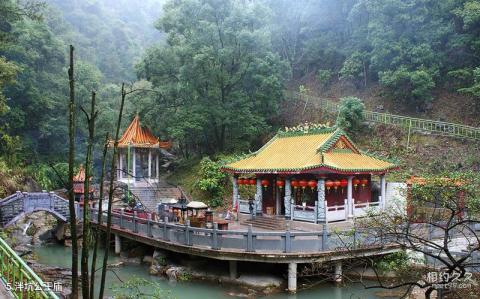
Introduction to Pankeng Gongwang Temple: Founded in the Ming Dynasty, it was originally called "Sanshan King Temple" and is commonly known as "Pangeng Gongwang Temple" by the villagers. The reputation of "Prince Pankeng protects his hometown" has spread far and wide, attracting many faithful men and women at home and abroad to burn incense and pray for blessings. Since the temple was built, the incense has continued.
According to "Jieyang County Chronicles", "Chaozhou Prefecture Chronicles" and "Mingkuang Temple Records" written by Liu Ximeng in the Yuan Dynasty: In the western border of Chaoyang, at the border with Huizhou and Meizhou, there are three peaks: Jinshan, Mingshan and Dushan. . The most unusually high one is Jieyang Mountain (also known as Dushan Mountain), 20 kilometers to the southwest is Mingshan Mountain, and turning to the south is Jinshan Mountain. It is said that during the Kaihuang period when Emperor Wen of the Sui Dynasty Yang Jian was enthroned, there was a Tianzhu Rock halfway up Mingshan Mountain. There were caves in the rock, and three immortals often showed their sanctity here. When Emperor Taizong of the Tang Dynasty was conquering Taiyuan, he encountered "immortals in golden armor, armed with swords and galloping horses to break out of the formation, and the division achieved a great victory. Liu Jiyuan surrendered. On the day of his triumph, he saw the cloud above the city and said: "Chaozhou Three Mountain Gods." He then issued an edict to confer Mingshan as the Qing Dynasty. Hua Shengde reported to the king, Jinshan assisted King Suning of the Ming Dynasty, and Dushan was named King Huiwei Hongfeng. He was awarded the title of "Ming Kuang" on the forehead of the temple.
The gods of the Three Mountain Kings of Chaozhou (actually present-day Lintian, Jiexi) were enshrined in Pankeng, Meizhou. This comes from a myth and legend: It is said that the Xiong family, a stranger from Pankeng, lived in Chaozhou (actually present-day Lintian, Jiexi) for a long time. One day, in his sleep, he saw a golden-armored god holding a commander's seal on his left hand and a sword on his right. He claimed to be King Suning of the Ming Dynasty who was assisting the government. He was ordered by the emperor to guard Meizhou and protect the people. When Mr. Xiong woke up, he was very surprised when he thought that when he went to Chaozhou "Mingkuang Temple" to offer incense during the day, he saw that the statue of King Jinshan in the temple was similar to the god he saw in his dream. So on the one hand, he sent people back to Pankeng, his hometown in Meizhou, to build a temple; on the other hand, he invited carving craftsmen to refine the three statues of the gods according to the appearance of the three mountain kings in the "Mingkuang Temple", and affixed them with real gold. Half a month later, the statues were carved, and Someone was asked to transport the "Three Mountain God Statues" on a colorful boat in an eight-carat sedan chair, along the river, disembark at Toutang in Meizhou, and then carry it into Pankeng and enshrine it in the newly built temple, where he was called "Pankeng King". From then on, while the Xiong family was away from home, their fortunes prospered and they made great achievements. Because Xiong was a foreigner in Pankeng, there was a legend that "Pankeng Duke protected his foreigner".
